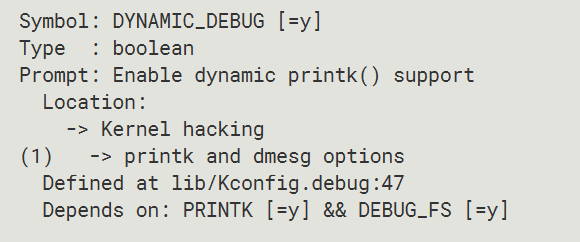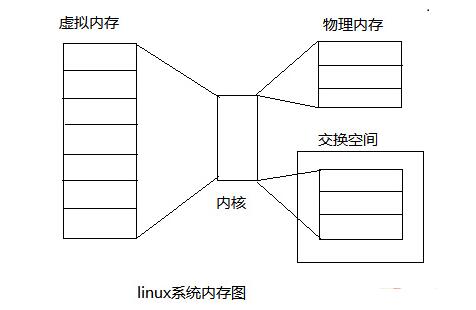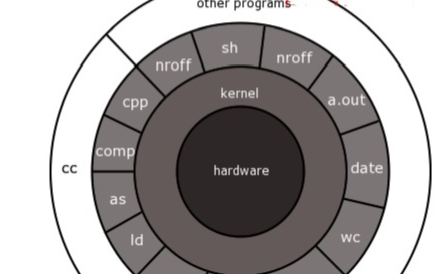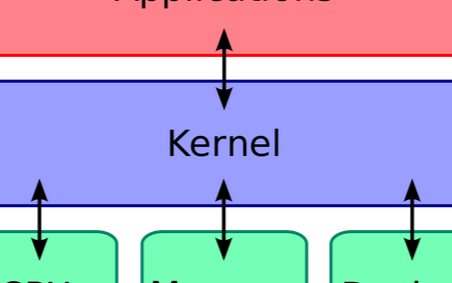動態輸出使用
打開svcsock.c文件中所有的動態輸出語句
# echo 'file svcsock.c +p' > /sys/kernel/debug/dynamic_debug/control
打開usbcore模塊中所有的動態輸出語句
# echo 'module usbcore +p' > /sys/kernel/debug/dynamic_debug/control
打開svc_process()函數中所有的動態輸出語句
# echo 'func svc_process() +p' > /sys/kernel/debug/dynamic_debug/control
打開文件路徑包含usb的文件里所有的動態輸出語句
# echo -n '*usb* +p' > /sys/kernel/debug/dynamic_debug/control
打開系統所有的動態輸出語句
# echo -n '+p' > /sys/kernel/debug/dynamic_debug/control
上面是打開動態輸出語句的例子,除了能輸出pr_debug()/dev_dbg()函數中定義的輸出信息外,還能輸出一些額外信息,如函數名、行號、模塊名字以及線程ID等
- p:打開動態輸出語句
- f:輸出函數名
- l:輸出行號
- m:輸出模塊名字
- t:輸出線程ID
另外,還可以在各個子系統的Makefile中添加ccflags來打開動態輸出語句
< ../Makefile >
ccflags-y += -DDEBUG
ccflags-y += -DVERBOSE_DEBUG
實際案例
例如在一個led驅動中的open()、write()等函數開頭添加一句pr_debug("%s entern",
**func **** ** );
#include < linux/module.h >
#include < linux/fs.h >
#include < linux/errno.h >
#include < linux/miscdevice.h >
#include < linux/kernel.h >
#include < linux/major.h >
#include < linux/mutex.h >
#include < linux/proc_fs.h >
#include < linux/seq_file.h >
#include < linux/stat.h >
#include < linux/init.h >
#include < linux/device.h >
#include < linux/tty.h >
#include < linux/kmod.h >
#include < linux/gfp.h >
static int major = 0;
static char kernel_buf[1024];
static struct class *hello_class;
#define MIN(a, b) (a < b ? a : b)
static ssize_t hello_drv_read (struct file *file, char __user *buf, size_t size, loff_t *offset)
{
int err;
pr_debug("%s entern", __func__);
err = copy_to_user(buf, kernel_buf, MIN(1024, size));
return MIN(1024, size);
}
static ssize_t hello_drv_write (struct file *file, const char __user *buf, size_t size, loff_t *offset)
{
int err;
pr_debug("%s entern", __func__);
err = copy_from_user(kernel_buf, buf, MIN(1024, size));
return MIN(1024, size);
}
static int hello_drv_open (struct inode *node, struct file *file)
{
pr_debug("%s entern", __func__);
return 0;
}
static int hello_drv_close (struct inode *node, struct file *file)
{
pr_debug("%s entern", __func__);
return 0;
}
/* 2. 定義自己的file_operations結構體 */
static struct file_operations hello_drv = {
.owner = THIS_MODULE,
.open = hello_drv_open,
.read = hello_drv_read,
.write = hello_drv_write,
.release = hello_drv_close,
};
static int __init hello_init(void)
{
int err;
pr_debug("%s entern", __func__);
major = register_chrdev(0, "hello", &hello_drv); /* /dev/hello */
hello_class = class_create(THIS_MODULE, "hello_class");
err = PTR_ERR(hello_class);
if (IS_ERR(hello_class)) {
unregister_chrdev(major, "hello");
return -1;
}
device_create(hello_class, NULL, MKDEV(major, 0), NULL, "hello"); /* /dev/hello */
return 0;
}
static void __exit hello_exit(void)
{
pr_debug("%s entern", __func__);
device_destroy(hello_class, MKDEV(major, 0));
class_destroy(hello_class);
unregister_chrdev(major, "hello");
}
module_init(hello_init);
module_exit(hello_exit);
MODULE_LICENSE("GPL");
為了方面查看,先清除內核輸出:
# dmesg -c
然后加載驅動,執行dmesg查看是否有打印:
# insmod hello_drv.ko
# dmesg

此時沒有pr_debug()的打印。這時再使用動態輸出打開hello_drv模塊的動態輸出:
# echo 'module hello_drv +p' > /sys/kernel/debug/dynamic_debug/control
然后執行該驅動的應用層程序,使其調用到驅動的open、write、close函數,從而執行pr_debug():
# ./hello_drv_test -w 10
再查看demsg內容:

可以看到,當打開了hello_drv模塊的動態輸出后,驅動中的pr_debug()語句就可以正常打印了。
再看看debugfs的control節點:
# cat /sys/kernel/debug/dynamic_debug/control

control節點記錄了剛剛執行pr_debug()時的文件名、所在行號、模塊名、函數名和輸出語句(p表示動態輸出的語句)。
-
內核
+關注
關注
3文章
1408瀏覽量
41072 -
驅動
+關注
關注
12文章
1898瀏覽量
86501 -
Linux
+關注
關注
87文章
11456瀏覽量
212735 -
輸出
+關注
關注
0文章
96瀏覽量
22116
發布評論請先 登錄





 Linux內核基礎:動態輸出使用
Linux內核基礎:動態輸出使用














評論